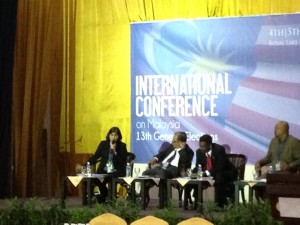 KUALA LUMPUR, 4 Mar — Chairperson of the Coalition for Clean and Fair Elections, Bersih, Ambiga Sreenevasan suggested that the civil society would only throw their support for the Election Commission (EC) only if the commission is dedicated towards cleaning up the electoral roll and holding free and fair elections.
KUALA LUMPUR, 4 Mar — Chairperson of the Coalition for Clean and Fair Elections, Bersih, Ambiga Sreenevasan suggested that the civil society would only throw their support for the Election Commission (EC) only if the commission is dedicated towards cleaning up the electoral roll and holding free and fair elections.
“If you clean up and if you are fair, we will be the biggest supporters of the system,” Ambiga said.
Ambiga said this when speaking at the International Conference on Malaysia 13thGeneral Elections here today, revealing her grievances over EC’s slow, if not sparse efforts in implementing reforms within the electoral system ahead of the country’s nearing polls.
The former Malaysian Bar Council president extended her doubts over the independence of the EC, saying that the commission’s low sensitivity towards different parties’ conflicts of interests is made obvious when EC officials have been seen issuing statements that are “biased in favour of one party over another”.
According to Ambiga, with remarks such as ‘nothing wrong with all the electoral officials being party members’ released unapologetically by top EC guns, it is of no surprise that the neutrality and credibility of the commission should be put into question.
“While saying these [statements], how could they [the EC] say ‘why don’t you have confidence to us?’” Ambiga asked.
A recently introduced clause by the EC for overseas voters also came under heavy criticism from Bersih at the conference. The new ruling stated that in order to qualify for postal voting, Malaysians overseas must have returned home in the last five years, and spent time in Malaysia for 30 days at minimum.
Ambiga motioned the 30-day benchmark as “unfair” as it has been “unilaterally imposed the EC” without engaging the matter with anyone else beforehand, particularly members of the public.
“In two months, how are they [postal voters] supposed to rush and fulfill the condition imposed by the Election Commission?” she argued. The ruling was only announced by the EC on January this year, with its deputy chairman Wan Ahmad Wan Omar remains convinced that the new rule is “reasonable”.
Things need to be fixed
Clearly unimpressed by the level of response given by the EC towards the civil society’s demands for electoral reform, Ambiga foresaw “no clarifications that things will be fixed” before the coming general elections, which has to be called by June.
“If you have an EC that is not responsive to complaints on the electoral roll, how can the public trust them?”
“Tell me why you cannot be transparent about the electoral roll, and then we can talk about free and fair elections in this country,” Ambiga reminded the EC, further describing the responses given by the commission as reaching a point that it is “so ludicrous as to insult our intelligence”.
“We could have cleaned up the electoral roll, and the civil society could have helped,” she said, repeating her regret towards the EC’s banal progress in paying heed to calls for better monitoring of the list of voters.
Nonetheless Ambiga took a lighter note on one of Bersih’s demands to have a 21-day period of campaigning, a timeframe longer than the 10-day provision currently allocated by the Election Commission.
“We now have two years’ period of campaign,” she noted, drawing laughter from the audience.
Speculations on the actual date of the 13th General Election has been lurking for nearly two years now, with both sides of the political divide have been far from silent in promoting their parties ever since.
Ambiga later lengthened her views in a lower tone regarding the freedom of media, noting that while it is the “easiest of the demands”, nothing significant has been done either by the EC or the ruling party to improvise.
Malaysia currently sits at the 145th place in a ranking released by Freedom of the Press 2013, a remarkably low position in a list of 179 countries.
No-nonsense election commissioners much needed
Responding to rampant cases of foreign workers being given instant Malaysian citizenships in exchange for their votes to the ruling party, Ambiga posed a question: “Is it acceptable to them [the EC] that foreigners are now able to vote in our country?”
Ambiga cited the case of a few Pakistani nationals that have been casting their votes as Malaysian citizens for five general elections. “They still go back to Pakistan,” she told the audience, “Seeing their families using Malaysian passports.”
“And they are laughing. They should be laughing at us!”
Ambiga then emphasized that it is crucial to have strong, no-nonsense election commissioners, who will stand up against whatever electoral misconduct there would be. The audience, made up of a sizable number of elected representatives, gave a loud thumping of the tables in agreement.
Ambiga also invited the participants of the conference and all interested Malaysians to visit Bersih’s website in finding out how to play a part in becoming election observers for the coming polls. — The Rocket



